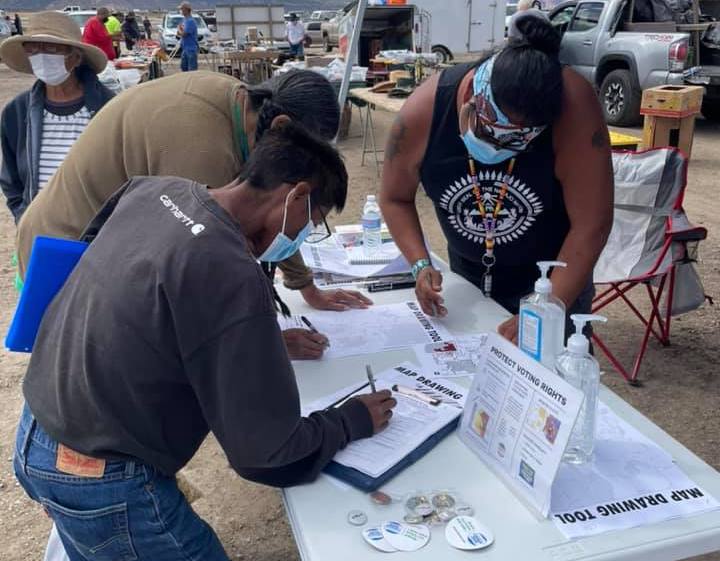
- Details
- By Judith LeBlanc
Guest Opinion. Native communities already experience obstacles to voting, from language barriers and lack of polling places on reservations to state laws which do not recognize Tribal identifications or accept reservation addresses that sometimes do not include house numbers or even street names.
The U.S. Government should be focused on ways to expand access to voting, but recently the U.S. House passed legislation that does the exact opposite. The so-called Safeguard American Voter Eligibility (SAVE) Act would require all voters to prove their U.S. citizenship when registering to vote or updating their registration. If this passes the Senate, even if you already have a government-issued ID like a driver’s license or Tribal ID, you’d still need a passport or birth certificate that matches your ID exactly before you could register to vote or update your voter registration.
The SAVE Act would disenfranchise millions of U.S. citizens who don’t have a passport or a birth certificate matching their legal name (including married women and transgender or two-spirit people). It would disproportionately harm Native voters, especially Indigenous elders, who are much less likely to have passports or birth certificates and instead rely on Tribal IDs, which don’t usually include one’s place of birth.
And if this bill passes, you would no longer be able to register to vote online or through the mail. Instead, this bill requires in-person registration, creating a significant additional barrier for Native peoples. Already, polling places are too few and too far from reservations and other Native communities; finding places to register to vote is even harder and could involve driving hundreds of miles.
We work to turn out the Native vote and have record turnouts as a result. Now, think about the impact of this bill.
The law targets anyone who might not have proof of U.S. citizenship papers readily available: Tribal citizens, naturalized citizens, elderly voters, and people living in rural areas without easy access to documents.
As many as 140 million eligible voters don’t even have a passport and millions don’t have access to their birth certificate. It’s estimated that as many as 69 million women do not have a birth certificate matching their legal married name. Many, if not most, people who identify as transgender or two-spirit do not possess a birth certificate reflecting the name they use either.
A Brennan Center study found that communities of color would be disproportionately affected, finding that 11% of voting-age citizens of color are unable to readily access proof of citizenship, while 8% of white U.S. citizens are in the same situation.
The SAVE Act is nothing more than a ploy to silence whole communities. It’s a modern day poll tax.
If Republicans succeed in passing this bill, it will be a step back to the days of Jim Crow, where the rich and powerful controlled elections and millions of voters of color were locked out of the democratic process.
Judith LeBlanc (Caddo), executive director of Native Organizers Alliance Action Fund, whixh is a partner to Native Organizers Alliance.
More Stories Like This
Building a World-Class Health System Through Data-Driven StrategyBuilding the Foundation Our Children Deserve
We're Still Here: Why It's Still a Good Day to Be Indigenous
Christopher Columbus Day! No Shame, No Guilt, No Conscience!
Columbus and His Day
Help us tell the stories that could save Native languages and food traditions
At a critical moment for Indian Country, Native News Online is embarking on our most ambitious reporting project yet: "Cultivating Culture," a three-year investigation into two forces shaping Native community survival—food sovereignty and language revitalization.
The devastating impact of COVID-19 accelerated the loss of Native elders and with them, irreplaceable cultural knowledge. Yet across tribal communities, innovative leaders are fighting back, reclaiming traditional food systems and breathing new life into Native languages. These aren't just cultural preservation efforts—they're powerful pathways to community health, healing, and resilience.
Our dedicated reporting team will spend three years documenting these stories through on-the-ground reporting in 18 tribal communities, producing over 200 in-depth stories, 18 podcast episodes, and multimedia content that amplifies Indigenous voices. We'll show policymakers, funders, and allies how cultural restoration directly impacts physical and mental wellness while celebrating successful models of sovereignty and self-determination.
This isn't corporate media parachuting into Indian Country for a quick story. This is sustained, relationship-based journalism by Native reporters who understand these communities. It's "Warrior Journalism"—fearless reporting that serves the 5.5 million readers who depend on us for news that mainstream media often ignores.
We need your help right now. While we've secured partial funding, we're still $450,000 short of our three-year budget. Our immediate goal is $25,000 this month to keep this critical work moving forward—funding reporter salaries, travel to remote communities, photography, and the deep reporting these stories deserve.
Every dollar directly supports Indigenous journalists telling Indigenous stories. Whether it's $5 or $50, your contribution ensures these vital narratives of resilience, innovation, and hope don't disappear into silence.
 The stakes couldn't be higher. Native languages are being lost at an alarming rate. Food insecurity plagues many tribal communities. But solutions are emerging, and these stories need to be told.
The stakes couldn't be higher. Native languages are being lost at an alarming rate. Food insecurity plagues many tribal communities. But solutions are emerging, and these stories need to be told.
Support independent Native journalism. Fund the stories that matter.
Levi Rickert (Potawatomi), Editor & Publisher
